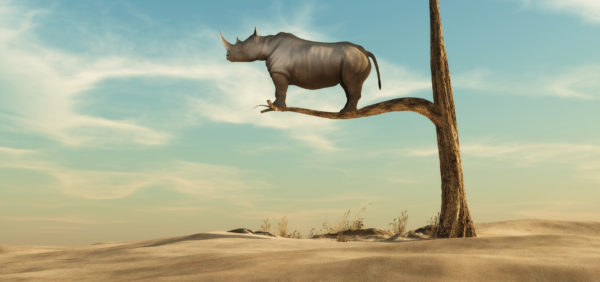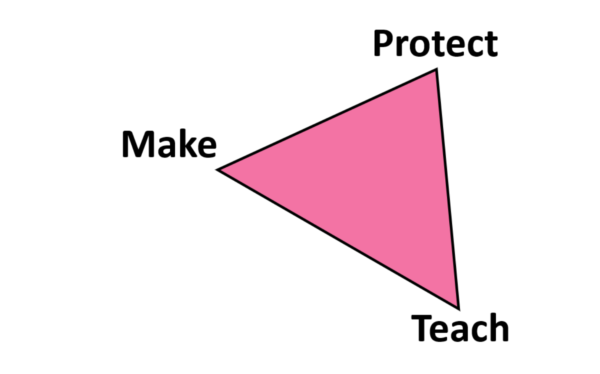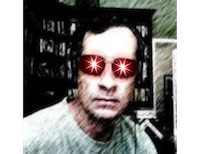
Last night I made the mistake of putting Ben Hunt’s The Long Now Part 2 on a tablet and brought it to bed to read. My kid had an early morning soccer practice at school today and the plan was I’d read this before turning in early. By the end of it I couldn’t sleep.
It articulated something I’ve been grappling with for so long, so clearly and so lucidly that it got my mind racing. I’m sure you all know how it is when you’re galvanized by an idea at night. You lie there in bed with your brain completely overclocked, scribbling in a notebook beside the bed. I ended up padding over to my office and emailing Mr. Hunt around midnight and he gave me permission to attach a PDF of the The Long Now Part 2 with the email I’m sending my list. It’s also online at the EpsilonTheory website.
From the very opening line, I should have known I was in for a sleepless night….
Every three or four generations, humanity consumes itself with the fang and claw of fascism and collectivism. Every three or four generations, we eat our own.
This is that time. This is the Long Now.
As it so happens, I had just started listening to Strauss and Howe’s The Fourth Turning this week, a book I’ve owned probably since the third turning but never got around to reading/listening to until now. I knew the overall concept of the Fourth Turning, and that by Howe’s reckoning we had entered the Fourth Turning with the Global Financial Crisis of 2008-09.
The Fourth Turning is a crisis period, what Hunt calls The Long Now…
In politics it takes the form of a widening gyre, where the center cannot hold against the onslaught of polarizing political entrepreneurs who eliminate the political promise of the future, replacing it with the Long Now of constant political fear. In economics it takes the form of a market utility, where those same illiberal political entrepreneurs eliminate the economic risk of the future, replacing it with the Long Now of constant economic stimulus.
Hunt calls forth the analogy of the Rhinoceros, after the 1959 novel by Eugene Ionesco. In the story the villagers in a central European town begin, one by each, turning into rhinos, and then running on destructive rampages through the town. It is a metaphor, Hunt tells us, that describes how fascism rises within an otherwise normal community….
People are a little puzzled at first, what with their fellow citizens just turning into rampaging rhinos out of the blue, but even that slight puzzlement fades quickly enough.
Soon it’s just the New Normal. Soon it’s just the way things are … a good thing, even.
The key point Hunt makes in his essay is this:
It’s not just bad people who turn into rhinos
Everybody is susceptible, and the penalty for buttressing oneself against the trend of “going Rhino” is utter and profound aloneness. It almost seems not worth it.
Your typical MAGA zealot is a rhino. So is everybody in Antifa. Both Paul Krugman and Sean Hannity are rhinos. People who mean well become rhinos because in the prospective Rhino’s mind
…the danger at hand is so great, so existential, that NOTHING MATTERS other than combating that danger, that you must sacrifice your most precious possession – your autonomy of mind – to believe in the necessity of these political actions. You must not only think that it is possible for 2 + 2 = 5 if the political exigency is urgent enough, you must believe that it is necessary for 2 + 2 = 5. Orwell called this “collective solipsism”. I call it political nihilism. Either way, THIS is the politics of the Long Now.
We are all in danger of “going Rhino”: Yesterday, in fact, I had just set up a new Twitter account, a parody that was to push a new blog I was spinning up whose intent was to be like the “F**kedCompany” of this generations’ forthcoming tech bubble implosion. It was cynical. Jaded. Biting. After reading The Long Now, I felt slightly ashamed of myself. It wasn’t helping. Even if I managed to get it off the ground it wasn’t going to be productive. It would be yet another source of acerbic angst in your social media feed. Who really needs that?
So this morning I shut the entire thing down and started writing this instead. As Hunt tells us, we can’t do anything about the disruption that is baked-in to a Fourth Turning / Long Now style unraveling. All we can do is to “refuse to become rhinoceros ourselves”, and in doing that, we take another tack:
Make, Protect, Teach
What resonated with me so much from reading this essay was because I’ve been trying to articulate something similar for a long time. It’s the basic premise behind “The Transition Overview: Building Companies That Matter” piece that kicked off Out Of The Cave back in 2017. In my last podcast with Charles Hugh Smith we talked about it (around the 38:19 mark):
MJ: when I look at Pathfinding [Our Destiny] like part seven where where we’re talking about what the way forward looks like, that it’s outside of the control of the of the establishment, that it’s outside of the system I get this sense that for society to flourish and adapt around this and evolve. I guess that’s the key word, we’re going do this around the institutionalized hierarchies.
They’re not going to get religion one day, we’re not going to elect the right candidate, we’re not going to have the right party gain power that’s suddenly going to say “I read this great book by Charles Hugh Smith and this is how we’re going to do it”.
It’s going to be something like institutionalized hierarchies will just lose more and more relevance as these new social and business and financial configurations start gaining more and more relevance.
CHS: That’s an excellent point and I think if anything I didn’t emphasize that enough. That really what we’re talking about is kind of like hacking the system in in the old time sense that a hack was a workaround. It wasn’t like you were breaking into the system to steal something, you’d created a workaround for a kludgy system that just didn’t work anymore.
And so I think you’re absolutely right, it’s going to be working around us and and Bitcoin is one example of how workarounds are manifesting and of course the status quo is going try to suppress those and/or co-opt them but what we’re really talking about is when systems fail at a systemic level you can’t reform them. You’re not going to make a policy tweak that’s going to fix higher education or the health care system. It just isn’t going work.
People are going to start working around that and they’re going be starting to pay cash for for medical care from pop up providers or remote physicians. Or there’s lots of different solutions to that in education. What I see the model that’s going to emerge whether people like it or not and is that students are going to start taking control of their own education and they’re going start organizing their own education.
They don’t need this bloated structure that charges them $70,000 a year and so that’s where technology, the internet and networking has really enabled a whole suite of solutions that basically bypass all the institutions that now hold the wealth and power, that have all this as you say institutionalized lethargy as as their their model.
It’s actually quite an exciting time but for those who are dependent on the system within these institutions it’s a very disturbing time
The way through the Long Now is not to vote in the correct political party in or to cajole professional panderers into decreeing the correct policies. We’re beyond that now.
All of this to pave the way for the punch line in The Long Now, Part 2, which is that
“The way through the Long Now is a social movement, not a political party.”
That sentence was why I couldn’t sleep last night. That’s what people like Charles Hugh Smith and Chris Martenson and George Gilder and Tom Woods and numerous others have been converging on for the last decade or so. That’s the emerging theme and Ben Hunt, in this essay I think, finally nailed the three word ethos of what is emerging: Make Protect Teach.

I believe that a decentralized and service-oriented social movement at scale can thrive in the age of social media technology. I believe that a decentralized and service-oriented social movement can both inoculate our hearts from the top-down Nudges that push us into rhinocerosness, as well as fill us with a positive energy that reverses the pervasive alienation that creates the Neb Tnuhs of the world.
It’s a social movement for a revitalized foundation of citizenship. It’s Make – Protect – Teach.
There’s no primacy to these three rightful objects of political power and the citizenship which drives them. Put Teach at the top of the triangle. Spin everything 90 degrees. Marry two of them. Take them independently. Change the colors and the font size. I’m not trying to be symbolic here.
I’m trying to be Real.
I’m trying to provide an alternative to the abstracted world of narrative and cartoon that rules our mindfulness from the top down, in favor of a concreted world of actual human beings making things and protecting each other and teaching each other, where we act as Stewards of our children’s future rather than as Managers of our personal now.
If I’ve done Hunt’s essay any justice in this piece you’ll set aside 15 or 20 minutes and read it sometime in the next day or so. I’ll feel like I’ve accomplished something if you did that.


I took the time and read Mr. Hunt’s piece, and while it raises some difficult questions for me as someone enmeshed in the business of using technology to make money for a large enterprise, it was well worth the read and will inspire a sleepless night of my own, I suspect.